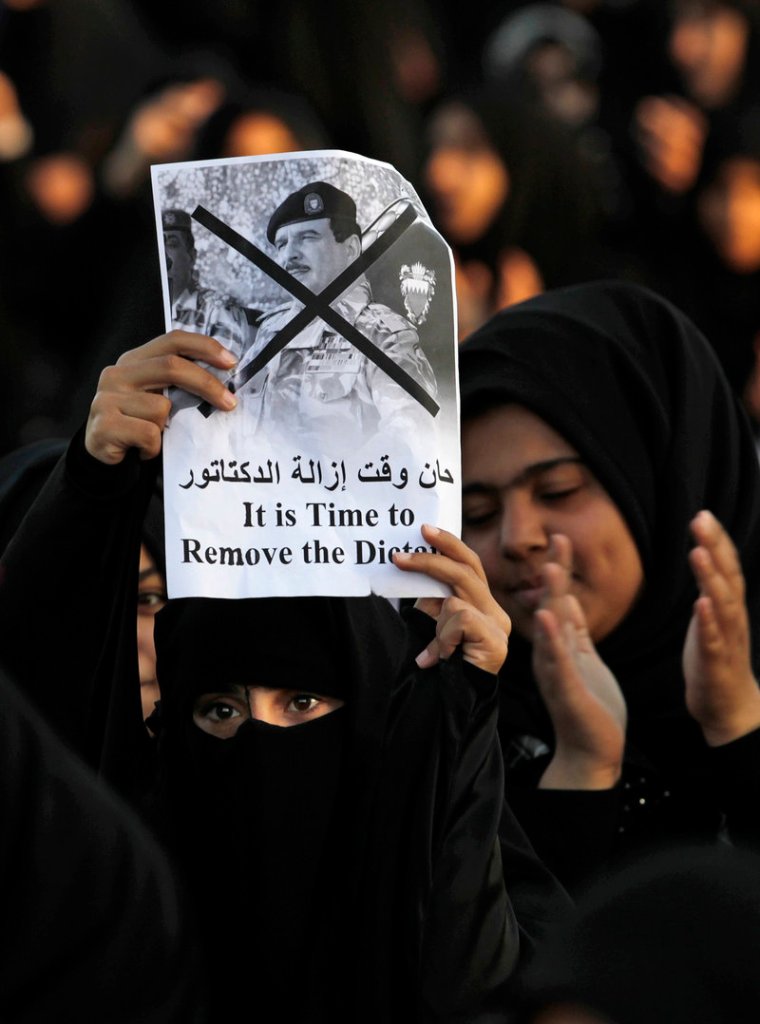SAN’A, Yemen – As fresh protests erupted across the Middle East and North Africa on Sunday, embattled leaders in the region struggled to contain their discontented masses, deploying a wide variety of tactics — from offers of dialogue to brutal crackdowns — to suppress the pro-democracy forces unleashed by the revolts in Tunisia and Egypt.
In the Libyan city of Benghazi, security forces opened fire on mourners attending funeral marches for 84 protesters killed the day before, their harshest response yet to the recent round of demonstrations. They also swiftly clamped down on smaller uprisings that spread to the outskirts of the capital, Tripoli, where protesters seized military bases and weapons.
Protests also broke out Sunday in Morocco and Tunisia, posing new challenges to their rulers, while authorities in Iran and Bahrain continued to confront calls for reform.
By late Sunday, the number of those killed in the uprising across Libya had soared to at least 233, most of them in Benghazi, according to Human Rights Watch. Other news reports placed the death toll at 200 or much higher.
U.S. and European Union officials on Sunday condemned Libya’s crackdown and called for an end to the violence. State Department spokesman P.J. Crowley said the United States is “gravely concerned” and has received “multiple credible reports that hundreds of people have been killed and injured.” Many of the victims had been killed with machine guns, witnesses said.
The scope of the turmoil in Libya is impossible to verify. Authorities have denied access to foreign journalists and have periodically cut off the Internet and phone lines. But the unfolding situation in Libya could mark the most brutal attempt to suppress the anti-government protests sweeping across the Arab world.
Residents and activists describe a volatile landscape that is increasingly isolated from the world and becoming bloodier and more chaotic by the day. The protesters seek the ouster of Libyan leader Moammar Gaddafi, who has ruled for more than four decades.
Gaddafi’s son appeared on state television early today, saying his father is in the country and backed by the army. “We will fight to the last minute, until the last bullet,” Seif al-Islam Gaddafi said, warning that if the unrest continues, the country could become engulfed in civil war and that Libya’s oil wealth “will be burned.”
Gaddafi’s regime also appeared to suffer its first defection Sunday when the country’s representative to the Arab League said he had resigned his position, angry about the government’s harsh tactics in Benghazi.
In Iran, security forces on Sunday violently put down attempted pro-democracy protests in Tehran and other cities. But elsewhere in the Middle East, besieged autocrats tried to offer olive branches after violent tactics failed to suppress the anger on their streets and the demands for them to resign.
In Yemen, President Ali Abdullah Saleh, who has ruled this impoverished country for 32 years, renewed his call for political dialogue with the nation’s main opposition parties, an approach that could lead to a power-sharing deal. The move followed the deaths of at least five protesters and dozens of injuries in nine straight days of demonstrations.
“We are ready to respond to their demands if they are legitimate,” Saleh told several thousand supporters Sunday in the capital, San’a. “Dialogue is the best way. Not sabotage. Not blocking the roads.”
Saleh is facing growing pressure from outside and within his fold. At least two lawmakers in his ruling party have resigned in recent days over the violent attempts by security forces and pro-Saleh mobs to put down the protests. On Sunday, thousands demonstrated and held sit-ins in Taiz, Ibb, Aden and San’a to demand that Saleh step down, according to local reports and witnesses.
Yemen’s main coalition of six opposition parties rejected his call for dialogue, declaring there would be no talks as long as Saleh’s loyalists and security forces assault protesters. “There is no dialogue with bullets, batons and acts of thugs,” the groups said in an e-mailed statement.
In Bahrain, Crown Prince Salman bin Hamad al-Khalifa continued to urge a national dialogue with opposition parties and a period of mourning to reconcile the nation’s majority Shiites and their Sunni rulers.
The emboldened opposition is now demanding a constitutional monarchy with a directly elected government, potentially weakening the rule of Bahrain’s royal family.
Thousands took to the streets in cities across Morocco, the first anti-government protests the country has seen since the wave of populist rebellions began.
In Casablanca, nearly 2,000 protesters called for greater economic opportunities, better public services, more freedoms and an end to corruption.
Send questions/comments to the editors.



Success. Please wait for the page to reload. If the page does not reload within 5 seconds, please refresh the page.
Enter your email and password to access comments.
Hi, to comment on stories you must . This profile is in addition to your subscription and website login.
Already have a commenting profile? .
Invalid username/password.
Please check your email to confirm and complete your registration.
Only subscribers are eligible to post comments. Please subscribe or login first for digital access. Here’s why.
Use the form below to reset your password. When you've submitted your account email, we will send an email with a reset code.